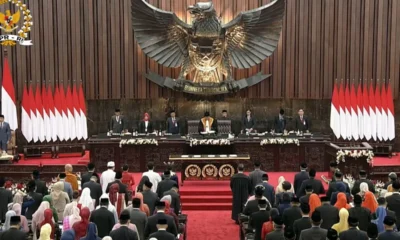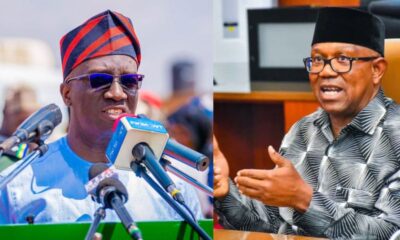Africa
Quality Over Quantity: Why Nigeria Must Focus on Strengthening Existing Universities -By Olasunkanmi Arowolo
If used wisely, this moratorium can depoliticise decision-making, upgrade infrastructure, and embed accountability. Nigeria’s universities could then become engines of national progress, producing not only graduates, but also the innovation, knowledge, and leadership needed to drive the country and continent forward. While this decision may not solve all challenges, it is a way of tackling them at the root. It allows the government time to reflect, prioritise quality over quantity, and invest strategically in existing institutions.

Nigeria’s higher education system is at a crossroads. With a growing and diverse population, the demand for tertiary education has never been greater. Yet, despite this pressing need, our institutions, federal, state, and private, are struggling to keep pace. Some argue that establishing more universities is the solution, and I recognise that this view comes from a genuine concern about limited access and unmet demand. Critics rightly point out that thousands of students are unable to secure admission each year. Yet, I take a different position: what Nigeria truly needs is quality, not just quantity. National development is driven by the effectiveness and impact of our universities, not the number of their campuses.
The data speaks for itself. According to the Minister of Education, Tunji Alausa, one northern university has 1,200 staff catering to fewer than 800 students. Across the country, 199 universities had fewer than 100 applicants through JAMB last year, with 34 recording zero applications. Meanwhile, 64 colleges of education received no applicants at all. The challenge in Nigeria’s tertiary education system is no longer access but inefficient duplication, poor infrastructure, inadequate staffing, and dwindling enrolment in many existing institutions. These figures reveal a critical imbalance: the resources we already have are not being optimally utilised, and creating more institutions without first addressing these deficiencies risks further inefficiency.
The Federal Government’s recent decision to impose a seven-year moratorium on the establishment of new federal universities, polytechnics, and colleges of education is, in principle, a sound strategy. Importantly, this pause applies only to new federal institutions. State governments and private actors are still free to establish their own universities, and their role in expanding access is vital. The federal government, however, must consolidate and strengthen what it already controls before opening new campuses. More so, its success depends entirely on how the pause is leveraged. It presents a unique opportunity to focus on strengthening the institutions we already have, and to do so in a strategic, research-driven manner.
Access remains an urgent concern; no one disputes that. But access without quality risks producing graduates who are ill-prepared for today’s economy. The real challenge is striking a balance: expanding opportunities while ensuring that existing institutions have the infrastructure, autonomy, and academic depth to deliver globally competitive education.
Strengthening existing universities requires more than cosmetic interventions. It demands serious investment in infrastructure, reliable electricity, and high-speed internet. These are foundational requirements for effective teaching, research, and student learning. Library facilities must be modernised, with access to global research databases and journals. Initiatives to harmonise and digitise African academic resources, such as those I have pursued through Research Africa, can also provide a crucial boost, making local scholarship visible and widely accessible.
Nigeria’s education system is grappling with poor funding, infrastructural decay, a shortage of qualified teachers, outdated curricula, corruption, and high rates of out-of-school children. While a moratorium alone cannot resolve these issues, it creates space for holistic reforms.
This consolidation also addresses long-standing concerns raised by the Academic Staff Union of Universities (ASUU). Our system suffers from overstretched resources, undermining both staff capacity and student outcomes. Concentrating resources on fewer, stronger institutions allows for measurable improvements in teaching and research, rather than spreading funds too thinly. Strategic investment in selected faculties or schools, focusing on quantifiable improvements, ensures that both staff and students benefit in tangible ways. Such a targeted approach enables demonstrable progress and strengthens the overall system.
Another critical dimension is the depoliticisation of higher education. Too often, universities are established in response to political pressures or regional lobbying rather than genuine educational need. Nigeria operates a federal system, and while education is not exclusively a federal prerogative, effective leadership sometimes requires stepping in to create order in a crisis. The federal government’s decision is therefore a legitimate exercise of national coordination. The moratorium is a framework through which the government can resist these pressures, making decisions based on evidence and research rather than political expediency. Expert panels should be tasked with visiting campuses, assessing infrastructure and academic performance, and engaging with stakeholders, which must include students, faculty, and administrators, to understand their needs and challenges. Only such a structured approach can ensure that resources are allocated where they are most needed.
Critics of the moratorium point out, rightly, that Nigerian graduates often excel abroad and that the creation of more universities will help churn out more graduates of this calibre. This is a source of pride and a testament to the resilience of our students. But imagine how much more they could achieve if their learning environments at home were consistently supported with uninterrupted electricity, well-equipped laboratories, and access to global knowledge platforms. It is not talent we lack, but the right environment to fully nurture it.
Ultimately, a true university is more than classrooms and certificates. It is a space for research, innovation, and vibrant intellectual life. A university must truly feel like a university. Adequate facilities, well-supported teaching staff, and lively campus life are not optional; they shape the quality of education. The duplication of institutions with inadequate staffing and under-utilisation has a ripple effect on the quality of graduates, which can undermine Nigeria’s competitive advantage even when students are talented and resilient. Establishing new institutions without these fundamentals risks creating glorified secondary schools that cannot meet the challenges of higher education in the 21st century.
The government’s decision to pause new federal institutions should not be perceived as a restriction, but as an opportunity. By prioritising quality while creating an enabling environment for states and private actors to expand access, Nigeria can build a higher education system that is both inclusive and globally competitive. For emphasis, this moratorium offers the current government an opportunity to position Nigeria to compete globally. Universities that are well-funded, strategically developed, and focused on achieving measurable outcomes will produce graduates equipped to meet international standards. Government, academic leaders, and stakeholders must work collaboratively to ensure every investment strengthens the system rather than dilutes it.
Indiscriminately adding new institutions without ensuring existing ones are strong enough to support them would dilute quality, perpetuate inefficiencies, and limit the country’s ability to excel academically and economically.
If used wisely, this moratorium can depoliticise decision-making, upgrade infrastructure, and embed accountability. Nigeria’s universities could then become engines of national progress, producing not only graduates, but also the innovation, knowledge, and leadership needed to drive the country and continent forward. While this decision may not solve all challenges, it is a way of tackling them at the root. It allows the government time to reflect, prioritise quality over quantity, and invest strategically in existing institutions.
Olasunkanmi Arowolo, PhD (Journalism, University of Kent), is a researcher, media practitioner, and advocate for quality education with expertise in journalism, digital governance, and media analysis. He is an Assistant Lecturer at the Faculty of Communications and Media Studies, Lagos State University, Nigeria. He can be contacted at oa@olaarowolo.com or on X/Twitter @olaarowolo




























